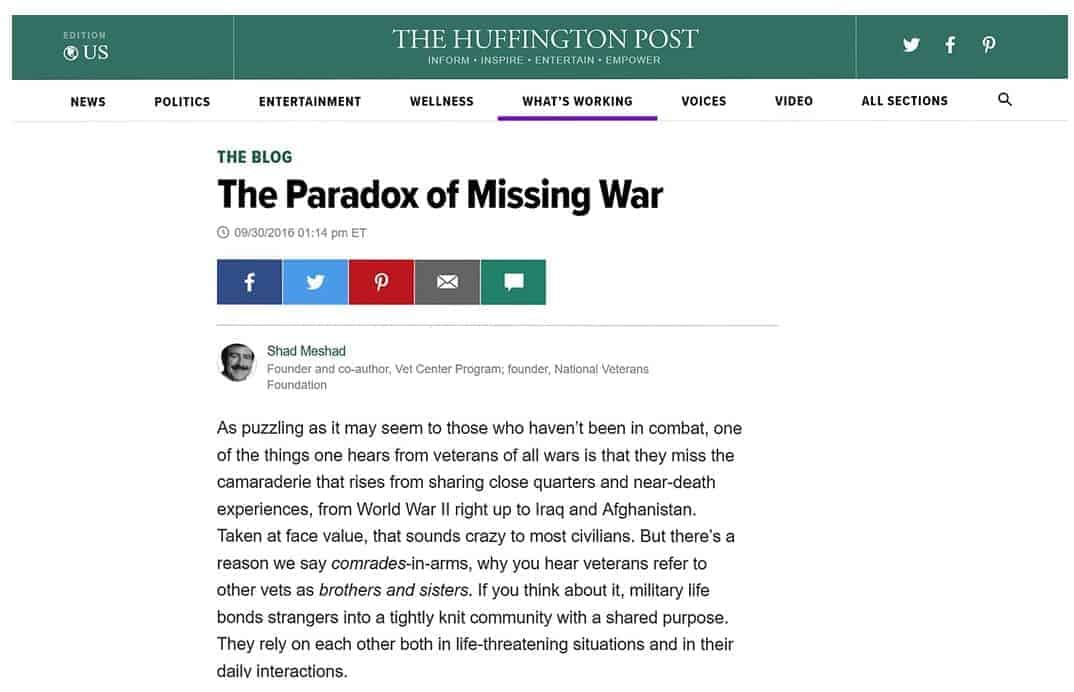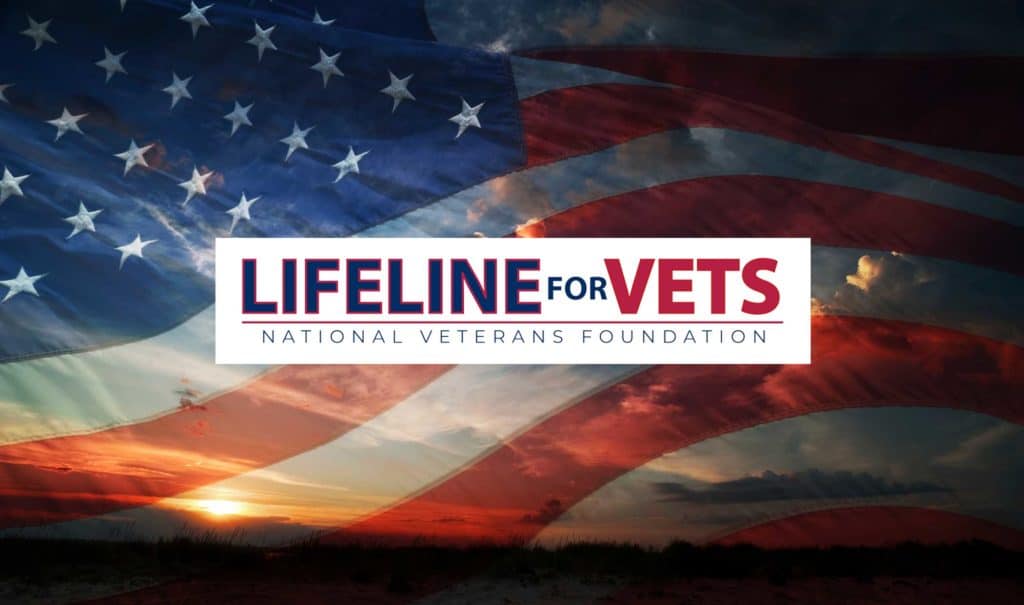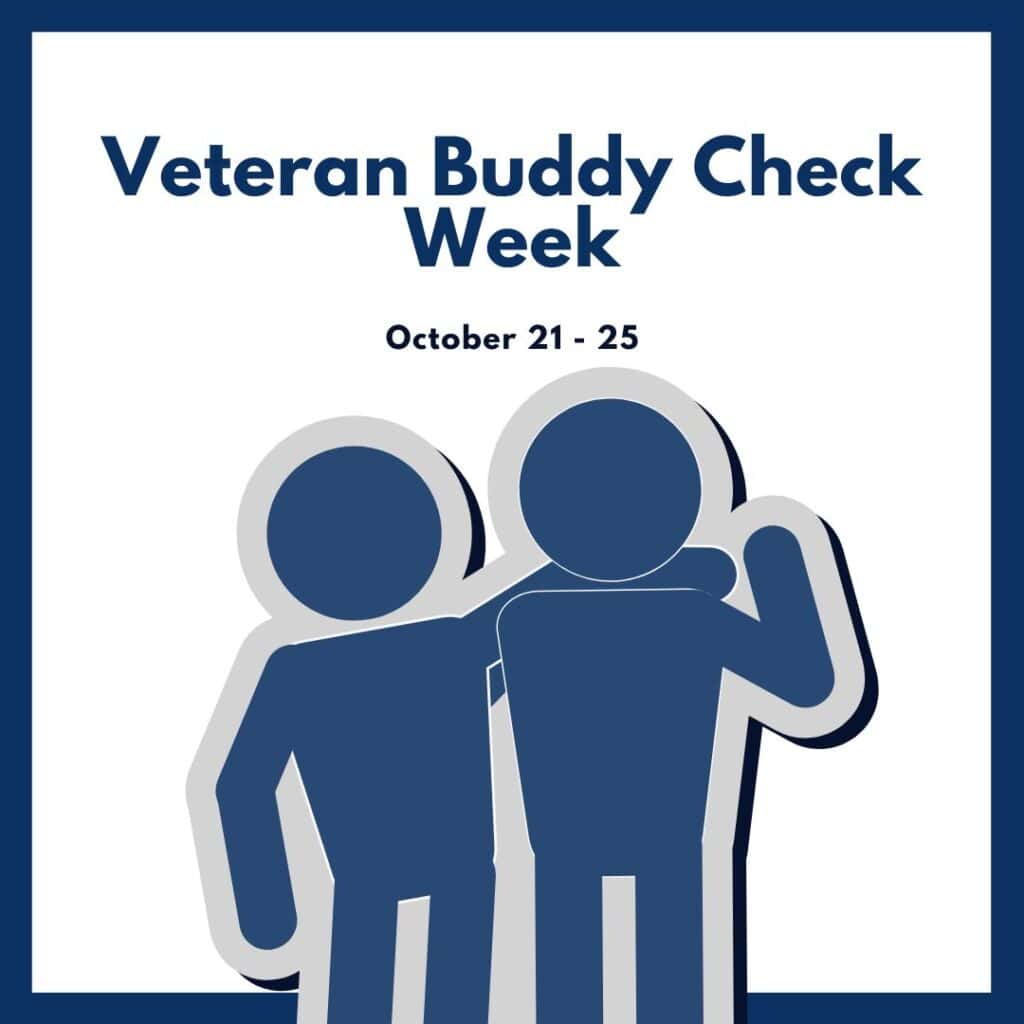The Paradox of Missing War
By Shad Meshad from his Blog at the Huffington Post
As puzzling as it may seem to those who haven’t been in combat, one of the things one hears from veterans of all wars is that they miss the camaraderie that rises from sharing close quarters and near-death experiences, from World War II right up to Iraq and Afghanistan. Taken at face value, that sounds crazy to most civilians. But there’s a reason we say comrades-in-arms, why you hear veterans refer to other vets as brothers and sisters. If you think about it, military life bonds strangers into a tightly knit community with a shared purpose. They rely on each other both in life-threatening situations and in their daily interactions.
Combat veterans are especially impacted when they transition from being a member of a cohesive group of people who confront the same dangers, face the same problems and share the same goals to individuals in a chaotic mass of other individuals. Those first months away from that kind of closeness, often fueled by adrenalin, can feel like free fall. Both men and women vets express nostalgia for what most of us would call extremely stressful times. Nostalgia is complicated, compounded as it is from memory, sorrow, grief, sadness, longing and loneliness. Often there’s an undercurrent of anger. When I first came back from Vietnam and was working with vets in the streets, I remember how many of them had these conflicted feelings. I know I did. Many Vietnam vets still do. Vets returning from our two most recent wars are no different.
Returning veterans leave a structured society where people have to work together and enter an unstructured one. From no man left behind to every man for himself. Quite a change. The first months are crucial, and they’re often the ones that young vets feel they can slide through. The danger is that the absence of that connectedness leaves a vacuum that can fill with depression, many times treated by self-medication. Men and women vets can become alienated not just from family and friends, but from civilian society as a whole. Skills gained in military service may not translate well into civilian society. The After Deployment website lays it out: “The teamwork you were used to may not exist, your coworkers may not be as committed.”
Philip Caputo, reviewing Sebastian Junger’s book Tribe: On Homecoming and Belonging, quotes from the book, “Humans don’t mind hardship, in fact they thrive on it. What they mind is not feeling necessary.” That’s why meaningful employment for vets is so important for a healthy transition. Jobs provide purpose, a community, a sense of self-value. That foothold on civilian life can make all the difference.
I think it all starts with a one-on-one connection. That’s humanity at its most basic. Years ago on our hotline, I took a call one night from a vet on the east coast. Standing in an isolated phone booth in a large metropolitan city, he’d used his last coins to call our hotline. Homeless and suffering PTSD, he knew no one else to call. I’d been on my way out of our West Coast office, about to switch off the lights when the phone rang. I went back in to answer it. The first thing I did was get the number he was calling from so I could call him back if the call dropped. It was snowing in New York. You can imagine how cold that phone booth had to be. After we’d talked a few minutes I put him on hold and called a couple of vet organizations I knew. In the end, someone was dispatched to pick him up from that phone booth and take him to a shelter where he could get a hot meal and a night’s rest. But I know in my bones that the real thing that changed the outcome was that he was able to talk to and to connect with another person, another vet.
Recently a vet called my personal cell in the middle of the night. His pistol was within reach but his service dog wouldn’t let him at it. We talked several times that night. He’d seem to settle and I’d tell him to get some rest, I’d call in a couple of hours. But the night terrors rose again and he’d call first. His connection with his dog, and the sound of another human voice made the difference. There’s not one of us who hasn’t experienced the power of connection to another person, whether by touch, voice or eye contact. It can be the equivalent of throwing a life line.
From my 44 years of counseling Veterans, I believe the take away from all this is that combat veterans connecting with other combat vets after coming home is essential to successfully readjusting to civilian life after war. War experiences just don’t go away after you take off the uniform, and being able to connect with someone who can validate those experiences and how alien they can make a veteran feel among civilians is critical to integrating those memories and the emotions they carry into the next phase of a combat veteran’s life.
Social media has made it easier for veterans to stay in touch with the men and women they served with, who shared those unique life and death experiences, and who are the group who best understands what their brother or sister veteran is going through. But nothing can replace face to face connection, and for veterans who are physically isolated from their former battle buddies, veteran membership groups like the VFW and American Legion can provide a connection with other combat veterans. Even a veteran of another war, while they may not have been in the same firefights as the readjusting veteran, has experienced similar enough events to provide the understanding and validation that can help a veteran feel like he or she isn’t crazy for feeling with the lingering effects of war.
The VA’s Vet Centers, with more than 300 locations all across the country are also a good resource for readjusting combat veterans. They provide a vet-to-vet connection and someone to talk to.
At the National Veterans Foundation, all the work we do stems from our commitment to that one-on-one connection, vet-to-vet. Because sometimes a bridge one person wide is enough to navigate safely across whatever gap or chasm yawns below. If you know a vet who needs to talk to another veteran here’s our number: 888.777.4443
Read Shad Meshad’s Blog at the Huffington Post
The National Veterans Foundation is dedicated to helping veterans of all eras get the information and resources they need after coming home and taking off their uniforms, to live successful lives in the civilian world. This article “The Paradox of Missing War” is one example of the wealth of resources that the NVF provides. To sustain this important work, we rely on the support of individuals like you, who care about our nation’s veterans. We receive no government support, and our programs are funded 100 percent by private individuals, businesses, and foundations. Every dollar makes a difference. Please make a donation today to help keep the NVF’s programs for veterans going.
You can be a part of our mission to help Veterans by making a tax-deductible donation!
About the Author
SUBSCRIBE TO OUR BLOG AND NEWS!
By submitting this form, you are granting: NATIONAL VETERANS FOUNDATION INC permission to email you. You may unsubscribe via the link found at the bottom of every email. (See our Email Privacy Policy for details.)
Related Posts





